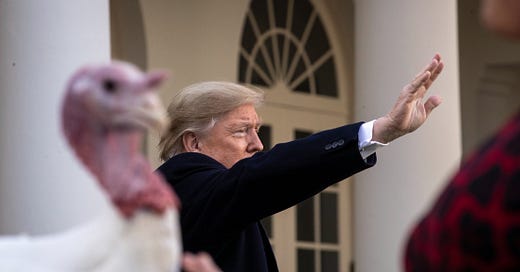Well We Still Haven't Done Anything About the Electoral College
Another election season in the shadow of disaster.
Another presidential election year is upon us. The voting is about to begin. Next Monday is the Iowa Republican caucus, followed by the New Hampshire primary eight days later. The national media is just about to slide into Perpetual Election Mode. Maps color-coded red and blue will be present on various screens without pause from now until November. “Strategists” of nebulous expertise will soon monopolize the airwaves. Political ads will blanket swing states. The party machines will grind in earnest. Idle conversations everywhere will turn to two old men that everyone is tired of. And all around us, pundits will opine weightily on Our Democracy and the omnipresent threats to its glory.
Just one thing, though, before we begin. One small remark. One little note to append here: Another presidential election year is upon us, and so is the Electoral College. The convoluted, antiquated, antidemocratic institution that has, in two of the six elections this century, awarded the presidency to the person who did not receive the most votes, is still very much in place. Yeah. In one-third of the elections of the past quarter century, this gnarled little nugget of Colonial-era elitism has seen to it that the person who lost the election by the standard that most normal humans have in their minds (who gets more votes) has actually won the election, because we as a nation never seem to get around to changing it. In the upcoming election, there is, as always, a legitimate possibility that the candidate receiving fewer votes may nevertheless win the White House because they received more “electors” according to a system that was just made up by some guys who did not know what electricity is. I feel that this RATHER LARGE ASTERISK bears mentioning before we all endure eleven months of cable news anchors practicing their Very Serious Faces as they mutter about the vital importance of voting as our democracy hangs in the balance.
We still. Have in place this thing. That not infrequently makes the loser of the election the winner. That is not a detail! That is pretty fucking central to the entire proposition of democracy! And when it happens we all just kind of shrug?? And then just move on with no apparent fervor for reform?? And here we are once again in the same exact place?? FYI.
Just to properly frame what I am saying here: I do not mean to sound like a low-information voter who just discovered the existence of this electoral abomination and is therefore fretting like a rube over something that all of the savvy political people have long understood and factored into their strategic calculations. No. I am arguing that all of us should, to the utmost of our abilities, cultivate and nurture our ability to be shocked and outraged by the continued existence of the Electoral College, and that we take a moment to recognize that our collective failure to mount any real efforts to scrap this laughably counterproductive relic is very, very stupid. Very stupid indeed. It is as if we all live in a house that was built with a trap door in the living room floor, into which one close relative or another plummets to their death every once in a while. And, when we notice that construction crews are busily building new wings on the sprawling house all the time, we say, “Maybe we should cover up that trap door?” And everyone rolls their eyes and ignores it. “It’s tradition,” they say. “Just learn to navigate the trap door properly! Idiot.”
The five most obvious reforms that would make America a better democracy are:
Ending partisan gerrymandering
Campaign finance reform
Ranked choice (or similar) voting to mitigate the flaws of our two-party system
Abolishing the Electoral College.
Of those five, numbers 1, 2, and 3—while certainly not easy—fall within the bounds of quasi-normal political issues that can be addressed legislatively and in fact are being addressed to some degree already, particularly at the state and local levels, although of course the tenor of those efforts can swing back and forth depending on how fascist the party in power is. Number 4 is, I admit, a dreamier goal, in the practical sense that it would involve forcing the Senate to participate in its own destruction. The most useful task at hand there is still talking about it enough to make it enough of a common sense mainstream position to at least make the Senate sheepish about itself. Number 5, the topic of today’s post, does not quite fall into either of those categories. Abolishing the Electoral College would require a Constitutional Amendment, meaning that it would be logistically more difficult than normal legislative reforms. It is not an obscure or unrecognized issue—there have been hundreds of bills introduced over the past two centuries to change the Electoral College, and all have failed. It is, rather, the sort of structural issue that is widely championed in the realm of theory, but which always seems far enough removed from the immediate demands of each campaign season that it can never pick up enough steam to persist in the public consciousness long enough to force action on Capitol Hill.
Some of this is straightforward party politics—like the Senate itself, the Electoral College tends to benefit smaller rural states, and therefore benefits Republicans. But if it were that simple, then “Abolish the Electoral College!” would be a prominent Democratic Party rallying cry. It ain’t. Beginning one day after Election Day, its prominence on the political agenda begins to recede, replaced by all the specific issues that the politicians want to legislate on. This lack of attention persists up until the next election approaches, at which point the pundits begin to casually remark again, in a purely tactical way, about how various combinations of swing states may or may not add up to a win in the popular vote, which may or may not equal an Electoral College win. The closest thing we have to a reform movement that persists between election cycles is the National Popular Vote Interstate Compact, an agreement that states can opt into to award their electoral votes to the winner of the popular vote. Thus far 17 states have opted in, but the plan will not take effect until it gains support from states with a majority of the country’s electoral votes, which is still 65 electoral votes away. The NPVIC is a good idea, and one that sidesteps the impossible gridlock of Congress, but the fact that such a hack of our own system is necessary highlights how fucking absurd this entire situation is.
Also, the NPVIC is still quite a ways off from being a reality, even as elections continue to happen every four years. Also, I will simply gesture here at the extent to which the fuckery in the aftermath of the 2020 election revealed that these sorts of agreements may be undermined by a political party determined to be corrupt.
So sure, abolishing the Electoral College in practice will be quite involved. For now, I have a more modest goal of trying to make sure that we are all, at all times during this campaign season, conscious of the fact that the whole act of voting may be, at the final moment, transformed into a cruel charade due to the vagaries of this stupid, stupid system that we allow to persist. Do not become inured to the existence of the Electoral College and its awful potential consequences. Pundits should not be waving around their ubiquitous color-coded maps without mentioning up front that this entire discussion is about a method of elections that makes real the possibility that the loser wins. That, in other words, your vote does not “matter,” at least not in the way that most people—idiots, bumpkins, ignorant citizens, uneducated fools who assume that democracy works—imagine. Let’s put this fucked up twist in our system at the center of our opining on elections, and not relegate it to the status of atrocities that we passively accept, like homelessness or Taco Bell.
Here is a completely made-up institution that directly caused the elections of George W. Bush and Donald Trump, against the popular will. Did that lead to any meaningful changes in world history, do you think? Perhaps a million people in Iraq, just to take one example, would still be alive today, were it not for the existence of the Electoral College? Interesting to ponder. Maybe we should be a bit more persistent in ridding ourself of this anti-democratic plague that is, I repeat, not a state of nature, but rather just a dumb, made-up thing. Maybe we could, at the very least, make this a serious campaign issue and ask all the candidates about it at all the debates and repeatedly emphasize in the media that this thing makes our alleged democracy a perpetual fraud.
Don’t be surprised if we spend an entire year screaming and crying and yelling at one another about the existential demand to cast a vote to preserve our very democracy and then, at the end, it gets overruled by this dumb bullshit that we never got around to fixing. We can’t say we didn’t see it coming.
Also
Previously: Abolish the Electoral College (and the US Senate); Big Panic for a Democracy That Never Was; Radical Is Now Rational.
Did I mention that I wrote a book, about the labor movement? It’s called “The Hammer” and it is coming out in one month and four days. (Sorry if you’re getting sick of hearing about it but bear with me for a little longer .) I’ll be going on book tour to a number of different cities, and I hope to put out the full schedule soon. In the meantime, I am doing a virtual book talk with Siena Chiang on February 8, viewable from the comfort of your own home, that you can sign up for here if you’re interested.
Thank you to everyone who has taken the time to subscribe to How Things Work, an experiment in making a viable living in independent media. Every new paid subscriber this month will be entered in a drawing to win an autographed copy of my book. If you’ve been on the fence, why not become a paid subscriber today? Your support of independent media will earn you great karmic rewards. Our teamwork makes the dream work.






Of the 9 presidential elections in my lifetime, the Democrat candidate has won the popular all but twice, yet a Republican has been president for just over half of my life.
I’ve been thinking a lot lately about how the very first door I ever knocked on for any campaign was in 2008 when my dad took 14 year old me with him to canvass for Obama and the guy who answered just said “my vote doesn’t count because of the electoral college” and how it’s fucking insane that he didn’t include a plank in his campaign to revive the Bayh-Celler amendment or something like it. He wouldn’t have even had to run on “the republicans stole the 2000 election” he could’ve just framed it as “hey nobody likes this thing anyway”